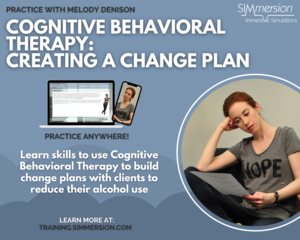Cognitive Behavioral Therapy: Creating a Change Plan with Melody Denison
Scenario
Melody Denison has agreed to use Cognitive Behavioral Therapy to reduce her drinking. In this session, identify her motivations and barriers for change and develop an individualized change plan to help her reduce her drinking habits.
Cognitive Behavioral Therapy (CBT) is one of the most used and extensively studied treatments for alcohol use disorders (SUDs). Once a client has been introduced to CBT and the connection between thoughts, feelings, and behaviors, it is helpful to begin discussing a change in drinking behaviors. An effective change plan is key to helping a client maintain change in their alcohol use.
Users
Social Work,
Healthcare & Students
Recommended Plays
3 - 5 minimum
Average Time
per Session
30 - 45
minutes
Teaching Objectives:
- Discussing Topics for Creating a Change Plan
- Developing a Positive and Collaborative Relationship
- Utilizing Core CBT Concepts to Structure the Conversation
Included in Training:
- A Training Guide with information on best practices for discussing change with a client.
- A Simulated Conversation with a varied character to prepare learners for clients with different motivations and barriers for change.
- Comprehensive Feedback during and after each play to help guide skill development.
This training was developed in collaboration with Binghamton University, Brown University, & Yale School of Medicine.
This training can be purchased as a part of the Cognitive Behavioral Therapy Training Suite. Please visit CBT Suite for more information.Research
Smith, M. J., Bornheimer, L. A., Li, J., Blajeski, S., Hiltz, B., Fisher, D. J., Check, K., & Ruffolo, M. (2020). Computerized clinical training simulations with virtual clients abusing alcohol: Initial feasibility, acceptability, and effectiveness. Clinical Social Work Journal. Read More


